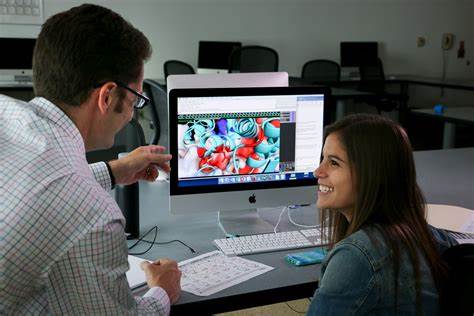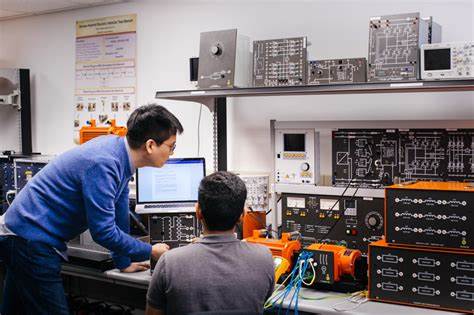Research faculty play a pivotal role in driving innovation and advancing knowledge across various fields. Their expertise and commitment to pushing the boundaries of understanding contribute to groundbreaking discoveries and advancements that shape our world. From exploring new treatment modalities in medicine to developing sustainable solutions in environmental sciences, research faculty are at the forefront of generating impactful and transformative knowledge.
These highly skilled individuals bring a wealth of expertise and experience to their work. By conducting rigorous investigations, analyzing data, and collaborating with colleagues, research faculty challenge existing paradigms and explore untapped potential. Their passion for discovery and curiosity fuels their pursuit of new ideas and novel approaches.
The Importance of Research Faculty in Driving Innovation
Research faculty are essential in driving innovation across industries. Their relentless pursuit of knowledge and commitment to pushing boundaries enable breakthroughs that have far-reaching implications. By constantly questioning existing assumptions, research faculty uncover new insights and possibilities that can revolutionize entire fields.
One prime example of the impact of research faculty in driving innovation is in the field of medicine. Medical researchers constantly strive to understand diseases better, develop new treatments, and improve patient outcomes. Through their tireless efforts, research faculty have contributed to the development of life-saving drugs, advanced surgical techniques, and innovative medical technologies. These breakthroughs have transformed healthcare and saved countless lives.
Moreover, research faculty salary play a crucial role in fostering innovation through interdisciplinary collaboration. By bringing together experts from different fields, they create a fertile ground for the cross-pollination of ideas and the emergence of novel solutions. This interdisciplinary approach has led to significant advancements in areas such as renewable energy, artificial intelligence, and biotechnology.
The Impact of Research Faculty on Advancing Knowledge
Research faculty are not only driving innovation but also advancing knowledge in their respective fields. Through their rigorous investigations, data analysis, and critical thinking, they contribute to the ever-expanding body of knowledge that forms the foundation of scientific understanding.
One key aspect of advancing knowledge is the publication of research findings in peer-reviewed journals. Research faculty disseminate their discoveries and insights to the broader scientific community, allowing for scrutiny, validation, and further exploration. This publication process ensures the integrity and credibility of knowledge, enabling other researchers to build upon existing work and collectively advance the field.
Additionally, faculty often engage in collaborative projects with industry partners, government agencies, and non-profit organizations. These partnerships facilitate the translation of research findings into practical applications and real-world solutions. By bridging the gap between academia and industry, faculty drive the adoption of new technologies, the development of innovative products, and the improvement of societal well-being.
Research Faculty and Interdisciplinary Collaboration
Interdisciplinary collaboration is a hallmark of research faculty’s work. They recognize that solving complex problems requires expertise from multiple domains and perspectives. By collaborating with colleagues from different disciplines, faculty can leverage diverse knowledge and approaches to tackle challenges that transcend traditional boundaries.
For instance, in the field of environmental sciences, research faculty from various disciplines such as biology, chemistry, and engineering collaborate to address complex issues like climate change and pollution. By combining their expertise, these researchers can develop comprehensive solutions that consider ecological, societal, and technological factors. This interdisciplinary collaboration not only enhances the quality of research but also leads to more holistic and effective solutions.
Furthermore, interdisciplinary collaboration fosters innovation by promoting the exchange of ideas and methods between different fields. It encourages researchers to think outside the box, challenge established norms, and explore unconventional approaches. This cross-pollination of ideas often leads to unexpected breakthroughs and paradigm shifts, driving innovation and advancing knowledge in ways that discipline-specific research may not achieve.
The Role of Research Faculty in Mentoring and Developing the Next Generation of Researchers
In addition to their research efforts, faculty play a crucial role in mentoring and developing the next generation of researchers. They guide and inspire young minds, cultivating a culture of inquiry and intellectual growth. By sharing their knowledge, expertise, and experiences, faculty ensure a continuum of innovation and progress.
Mentorship by faculty provides aspiring researchers with valuable guidance and support throughout their academic journey. They help students navigate the complexities of research, develop critical thinking skills, and instill a passion for discovery. Through one-on-one mentoring, faculty can identify and nurture the unique strengths and interests of each student, empowering them to become independent researchers in their own right.
Moreover, faculty often provide opportunities for students to actively participate in research projects. These hands-on experiences allow students to apply theoretical knowledge to practical problems, develop research skills, and gain a deeper understanding of the research process. By involving students in research, research faculty foster a sense of ownership and engagement, cultivating a new generation of scientists who are driven to make significant contributions to their fields.
Challenges Faced by Research Faculty
While faculty play a vital role in driving innovation and advancing knowledge, they face numerous challenges that can hinder their work. One significant challenge is securing funding for research projects. Research requires significant financial resources for equipment, materials, and personnel, and obtaining funding can be highly competitive and uncertain. The limited availability of funding can restrict the scope and scale of research, preventing faculty from fully exploring their ideas and potential.
Furthermore, faculty often face intense pressure to publish and produce impactful results. The publish-or-perish culture prevalent in academia can lead to a focus on quantity over quality, potentially compromising the rigor and integrity of research. This pressure can also lead to a lack of time for deep exploration and reflection, hindering the generation of innovative ideas and breakthroughs.
Additionally, faculty often face challenges in balancing their teaching and mentoring responsibilities with their research commitments. Teaching demands significant time and energy, leaving less time for research activities. This can result in reduced productivity and slower progress in research projects, impacting the ability of research faculty to drive innovation and advance knowledge.
Strategies for Supporting and Empowering Research Faculty
Recognizing the importance of faculty in driving innovation and advancing knowledge, it is crucial to support and empower them in their work. Institutions and organizations can implement strategies to alleviate the challenges faced by faculty and create an environment conducive to their success.
One key strategy is to provide adequate funding and resources for research projects. By ensuring a stable and sufficient funding stream, faculty can focus on their work without the constant worry of financial constraints. Funding agencies and institutions can establish transparent and equitable evaluation processes that consider the quality and potential impact of research proposals rather than solely relying on quantitative metrics.
Moreover, institutions can promote a culture of collaboration and interdisciplinary research. By creating platforms and incentives for researchers from different disciplines to collaborate, institutions can foster an environment that encourages cross-pollination of ideas and promotes innovative research. This can include establishing interdisciplinary research centers, organizing regular interdisciplinary seminars, and providing funding specifically for interdisciplinary projects.
Furthermore, institutions can provide support and resources for faculty to enhance their teaching and mentoring capabilities. This can involve offering training programs on effective mentorship, providing teaching assistants to assist with teaching responsibilities, and reducing the administrative burden on faculty to allocate more time for research and mentorship activities.
Research faculty play a multifaceted role in driving innovation and advancing knowledge. Their expertise, passion for discovery, and commitment to mentorship contribute to groundbreaking discoveries, transformative knowledge, and the development of the next generation of researchers. By supporting and empowering faculty, we can foster an environment that nurtures innovation, fuels progress, and shapes a better future for all.



